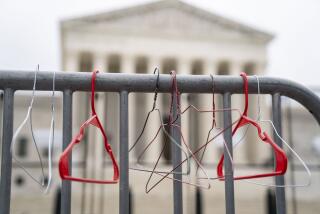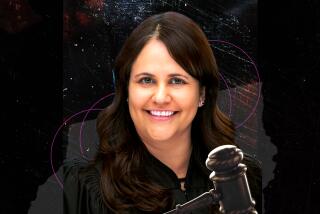Obama broadens search for Supreme Court nominee
Reporting from Washington â President Obama cast a wider net Wednesday in his search for a Supreme Court nominee, adding a federal judge from Chicago to his working list and soliciting suggestions from lawmakers in a closed-door session.
Judge Ann Claire Williams, the first African American ever appointed to the U.S. 7th Circuit Court of Appeals, joins a list of about 10 other candidates to replace retiring Justice John Paul Stevens, the White House confirmed.
Obama said Wednesday that he would announce a nominee before the end of May, but aides to the president â a former constitutional law lecturer â said he was nowhere near winnowing his list of candidates. Senior administration officials say Obama wants to look outside the so-called judicial monastery: the domain of federal appeals court judges and top-tier law professors.
In a bipartisan meeting with Senate leaders and Judiciary Committee members, Obama said he was interested in hearing their âthoughts and concernsâ and that they should feel free to submit the names of judges they wanted considered.
After the meeting, Senate Majority Leader Harry Reid (D-Nev.) and Sen. Patrick J. Leahy (D-Vt.), chairman of the Judiciary Committee, said they had recommended candidates to the president but would not elaborate.
The gulf between the president and the Republicans at the meeting was evident, even as Obama promised he would not rule out candidates based on their views on abortion rights or any other particular issue.
âI donât have litmus tests around any of these issues,â Obama said in response to a reporterâs question. âBut I will say that I want somebody who is going to be interpreting our Constitution in a way that takes into account individual rights, and that includes womenâs rights, and that is going to be something that is very important to me.â
White House aides said this week that Obama was searching for a nominee who could build a consensus on the court â much like Stevens has done over his nearly 35-year career â and was less interested in a judge who would simply dissent from the left. That seems to be an indication that the president is more inclined to choose a moderate judge, who also may face less of a fight from Senate Republicans in an election year in which the White House wants to focus on its domestic legislative agenda.
The favorites for the nomination appear to remain Solicitor General Elena Kagan and federal appeals court Judges Merrick Garland and Diane Wood, but the White House has also been considering other candidates, including Homeland Security Secretary Janet Napolitano and former Georgia Supreme Court Chief Justice Leah Ward Sears.
Before she became a lawyer, Williams was a music and third-grade teacher in the Detroit public schools. She spent nine years as an assistant U.S attorney in Chicago, trying major felony cases and ultimately becoming chief of the Organized Drug Enforcement Task Force for a five-state region. President Reagan first appointed her to the federal bench in 1985, making her the first African American woman to serve as a district judge in the 7th Circuit. President Clinton elevated her to the appellate court.
More to Read
Get the L.A. Times Politics newsletter
Deeply reported insights into legislation, politics and policy from Sacramento, Washington and beyond. In your inbox three times per week.
You may occasionally receive promotional content from the Los Angeles Times.










